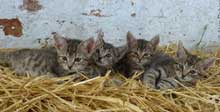
Once weaned, your kitten is dependent on you to provide a diet that is complete and balanced for its healthy growth and development.
Kittens grow rapidly and require higher levels of energy and nutrients, up to 3 to 4 times the amount needed by an adult cat. They need extra protein and just the right amount of vitamins and minerals for strong bones and teeth.
What to feed your kitten
Premium growth diets are specifically designed for kittens and are the best way to ensure your kitten receives the right amount of protein, fat, vitamins and minerals in the correct proportions for growth. Dry and canned varieties are available and kittens can be fed a mixture according to feeding guidelines on the label.
Kittens can be started on canned food or moistened biscuits from 3 – 4 weeks of age while still on their mother and should be fully weaned by 6 – 8 weeks old. Kittens need be fed at least 3 times day until they are 4 – 5 months old, then gradually reduce to 2 feeds a day by the time they are 8 – 9 months old.
How much should I feed my kitten?
Kittens should be offered as much food as they like at each meal to ensure they have an adequate intake of nutrients – they are unlikely to overeat at this stage in their life.
Kittens vary in their individual requirements and some grow at a faster than others. They will generally eat enough to satisfy their needs within 20 minutes or so – after this remove any uneaten portions and replace with fresh food at the next meal.
Tips on feeding your kitten
- Serve cat food at room temperature – warm food smells better
- Any changes in diet need to be made gradually over 3 to 4 days to avoid digestive upsets
- Don’t disturb your kitten while feeding
- Place feeding and drinking bowls in a quiet place and keep them clean
- Always have a fresh supply of water available
- Use a high quality food designed for kittens – supplements won’t be required
- All-meat diets are inappropriate for kittens and cause bone deformities
- Dog or puppy food is not suitable for kittens – they have different requirements
- Milk can be fed but dilute with water first – some cats are lactose intolerant
- Train your kitten to chew on bones to help keep the teeth clean as an adult cat – start with raw chicken wing tips, and progress to the whole wing and chicken necks
By Provet Resident Vet
Contributor: Dr Julia Adams BVSc
Last updated on 20 December 2019